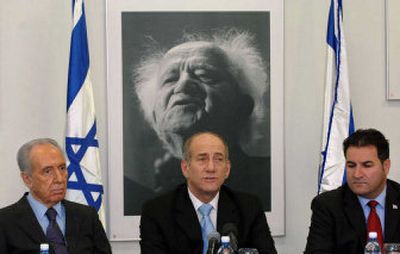Israeli leader extends ‘hand in peace’

JERUSALEM – Seeking to build on a shaky cease-fire with the Palestinians, Israeli Prime Minister Ehud Olmert offered Monday to free prisoners, lift checkpoints and release funds withheld from the Palestinian Authority in return for decisive steps toward peace.
In one of his most conciliatory speeches, Olmert spelled out Israel’s likely concessions under a final peace accord, including a withdrawal of its troops and many of its settlements from the West Bank, and the establishment of a Palestinian state.
“I hold out my hand in peace to our Palestinian neighbors in the hope that it won’t be returned empty,” he said during a ceremony at the tomb of David Ben-Gurion, Israel’s founding father.
The offer was a switch for Olmert, who declared during his election campaign last spring that no Palestinian leader was capable of making a deal with Israel. Since his election, he has worked to isolate the Hamas-led Palestinian government.
Monday, he invited the Palestinians to help negotiate a lasting settlement, saying they stand at a “historic crossroads.”
Hours after the speech, two rockets fired from the Gaza Strip fell harmlessly in the Israeli border town of Sderot, violating a truce started two days ago and threatening to undercut U.S.-backed diplomatic steps toward a meeting between Olmert and Palestinian President Mahmoud Abbas.
Palestinian leaders reacted to Olmert’s initiative with caution and skepticism.
“We want serious negotiations,” said Nabil Abu Rudaineh, a spokesman for Abbas, whose Fatah Party is more moderate than Hamas. The spokesman welcomed the prospect of a release of prisoners and funds but added: “We want to see acts, not just words.”
Ghazi Hamad, a Hamas government spokesman, dismissed the Israeli leader’s speech as “a new maneuver” but did not reject the idea of talks between the two sides.
“Olmert is speaking about the Palestinian state without giving details about the borders,” the spokesman said.
Olmert spelled out his conditions for a revival of Israeli-Palestinian peace talks, which collapsed nearly six years ago at the start of a Palestinian uprising.
First, he said, the Palestinians must release Israeli Cpl. Gilad Shalit, whose capture in a cross-border raid by Hamas and other armed groups in June set off five months of fighting that the weekend cease-fire accord aimed to halt.
And, he said, the Palestinians must establish a new government committed to principles set by the United States and other Western governments but so far rejected by Hamas: recognition of Israel, renunciation of violence and acceptance of previous Israeli-Arab peace accords.